The Fall 2021 Preview Guide
Platinum End
How would you rate episode 1 of
Platinum End ?
Community score: 3.2
What is this?
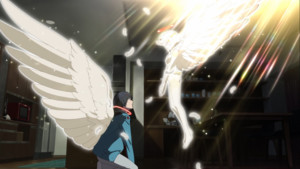
Protagonist Mirai Kakehashi is a boy unable to find the hope to live. On the day of his junior high graduation ceremony, while his classmates are taking part in the festivities, he's alone. But his battle is just beginning when he receives some salvation from above in the form of an angel. Now Mirai is pitted against 12 other chosen humans in a battle in which the winner becomes the next god of the world. Mirai has an angel in his corner, but he may need to become a devil to survive.
Platinum End is based on Takeshi Obata and Tsugumi Ohba's manga and streams on Crunchyroll and Funimation on Thursdays.
How was the first episode?
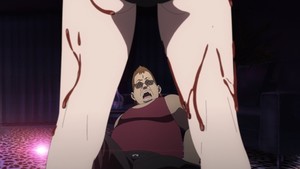 Caitlin Moore
Caitlin Moore
Rating:
As I watched Platinum End, I couldn't help but think of Bakuman., the second manga by Tsugumi Ohba and Takeshi Obata, the writer/artist team behind the hit manga Death Note. There was a profound anxiety in it about being a one-hit wonder, creating a single hit series and then failing to create a single thing audiences wanted to read ever again. While Ohba/Obata have clearly managed to avoid being one-hit wonders, it still seems that they only ever had one idea, because Platinum End looks to be a pointlessly edgy rehash of Death Note, with a few inverted elements. Instead of the arrogant Light Yagami being approached by a shinigami, Mirai is rescued by an angel when he jumps off a building. Both are offered absurdly powerful divine abilities, and end up pulled into murder games of cat-and-mouse.
Here's the thing: I've never liked Ohba/Obata. I wasn't pulled into the Death Note mania in high school (oh dear, I've dated myself), and I consider Bakuman. a dreary slog full of walls of text, self-congratulatory back-patting, and raging misogyny. And so, it is utterly hilarious to me that Platinum End is a creatively stagnant, 4-edgy-5-u piece of ephemera showing that those two never outgrew the 00's emo sensibilities. It's bad.
There are actually some decent moments. Wait, no. There's one decent moment: when Nasse grants Mirai the power of flight, calling it “freedom.” It's sentimental, but I felt a twinge as Mirai, who has been abused for much of his life, soars over the clouds and his eyes widen at the sight of the sunset from so high up. Able to travel faster than the human eye can detect, he flies to Ireland and South America, taking a break atop an Aztec pyramid. I admit I'm pretty easily taken in by these things, but what can I say? It worked for me.
But then the episode keeps going, leaning straight into bullshit philosophy about how if devils exist, it is only in the heart of man and other varieties of edgy nihilism. It's weird that his second power is to make people fall obsessively in love with him; straight-up mind control would be easier to implement and carry way less baggage. He makes his aunt fall in love with him to learn the truth of what happened to his family and little brother, and then she kills herself out of guilt with a knife. Blood sprays all over the room, and the camera luridly zooms in first on her barely-clad butt and then her corpse's agony-contorted face. Which it goes back to several more times. I didn't count but it was at least five. Oh, and Mirai implies that stealing a 150-yen melon bread is comparable to blowing up a family for the sake of murder. It's ridiculous.
I willingly and gleefully spoiled myself on the ending of Platinum End ages ago, so I know that it's only downhill from here. It's pointless, edgy nihilism all the way down, and its only redeeming feature is how ludicrous it is
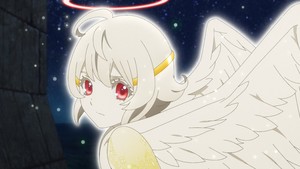 Richard Eisenbeis
Richard Eisenbeis
Rating:
Platinum End leans hard into the tragedy that is Mirai's life in this opening episode. It starts with his attempted suicide and has numerous flashbacks to the terrible treatment he has received growing up. While this can seem a bit heavy-handed, it's important to get us on Mirai's side as quickly as possible—ideally while making us despise his aunt and uncle in the process. If we're not by the time he inadvertently makes his aunt kill herself, he comes off as a monster instead of a victim.
It helps that, despite being beaten down, Mirai has retained a moral code—something he clings to even after getting his own personal angel. He is never really tempted by his newfound power; all he really wants for his future is a normal life—and he isn't willing to kill or steal to get it. “A normal life” is also Mirai's answer to Platinum End's big philosophical question: What is happiness?
Of course, his is far from the only possible answer to the question. By the time the credits roll, we see glimpses of two other answers. For one, happiness is extreme self-indulgence. For the other, happiness means dishing out justice as a superhero. I suspect that we'll get a total of 13 answers over the course of this series, and I look forward to seeing how these ideals conflict with one another—likely with lethal results.
But more than Mirai's tragic past and the anime's philosophical musings, the thing I enjoyed most about this first episode of Platinum End' is our guardian angel, Nasse. While Nasse seems bright, cheerful, and innocent on the surface and has a humanoid shape, she is a being fundamentally different from humans. She doesn't seem to be driven by human morality, nor does she have any empathy for humans in general; mind-controlling them or watching them die in horrible ways doesn't even faze her.
In fact, I doubt she experiences or understands human emotions as we understand them in the first place. She has little idea on how to help Mirai attain happiness because she doesn't feel happiness as he does. She can only guess at what might make a human happy from a complete outsider's perspective, such as money or the deaths of those that bring unhappiness. Her alien nature makes her a terrifying creature—and one I can't wait to see more of as the series continues.
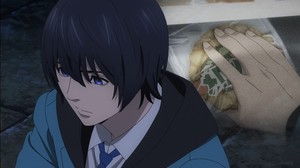 James Beckett
James Beckett
Rating:
A part of me can't help but appreciate shows like Platinum End, which are completely unwilling to compromise their commitment to a deeply stupid and silly artistic vision. Not only is it chock-full of needlessly convoluted mythology and steeped in a deeply cynical worldview, it's also unbelievably, embarrassingly earnest. Despite having roughly the same understanding of genuine human suffering that you'd find in the fanfiction of any teenaged edgelord that just got his parents' permission to watch Tarantino movies without adult supervision, Platinum End seems confident that it actually has something meaningful to say about the nature of good and evil, and what it means to seek happiness in the world.
This, by the way, is a show that centers around Mirai, a suicidal guy who is rescued from self- annihilation by a naked, sociopathic angel named Nasse, who grants him a bunch of stupid, angel-themed superpowers that give him the ability to fly, control peoples' minds, and kill people instantly. Not only does Nasse want Mirai to exploit these powers for his own personal gain as an act of vengeance on the people who enabled his suffering for so long, she also presumably expects him to survive the upcoming war between all of the other weirdos with angel powers. There's a contest to see who gets to become God, you see, and it will doubtless be settled with gallons upon gallons of weird, kinky bloodshed.
That's right, folks: For all of Platinum End's attempts to flail vaguely in the general direction of human emotions, it's really just a reskinned Future Diary. Also, for all of the criticisms you could easily throw at Future Diary's, I at least recall that show making an attempt at being stylish. Takeshi Obata has never been my favorite artist, but even a casual Googling of the Platinum End manga gives me the impression that the source material might have something going for it, visually speaking. This? This is just the animated equivalent of plain, room-temperature mashed potatoes. Nasse is the most underwhelming angelic figure I can recall from recent memory, since her janky-looking ass-cheeks are maybe the single notable thing about her design.
The scenes of Mirai flying with his goofy wings are the closest the episode comes to demonstrating genuine effort…and then it all devolves into cliché bursts of juvenile ultraviolence, and it's all just so tiring. In worse moods, I might have found Platinum End to be off-putting and crass, but right now the only response I can muster up is boredom. If something truly, truly outrageous happens that's worthy of a check-in, feel free to let me know on Twitter. Otherwise, I'll be glad to sit this particular death game out.
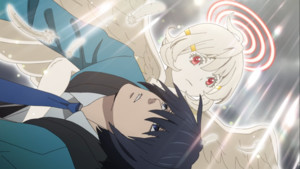 Nicholas Dupree
Nicholas Dupree
Rating:
This one's a show I'd been anticipating for all the wrong reasons. While I've not read all of the original manga, what I have read assured me that whatever entertaining story or character ideas Takeshi Obata and Tsugumi Ohba utilized in Death Note and Bakuman. had completely dried up. So when it was announced that their latest series was getting a full anime adaptation, I was ready to break out the popcorn and watch this awkward, flaming wreck of exposition and edge (edgeposition?) flop on the ground for six months. And so far my expectations have been met with flying colors.
Make no mistake, Platinum End is a mess, almost from the word go. This first episode is a five-car pileup of exposition, racing through our jaded, miserable hero's suicide, rescue, bloody epiphany, and drafting into the battle for godhood in the span of a single half-hour. There's no time for anything like character building, or giving our lead and his angel sidekick discernible personalities or goals. Not when we have to clumsily introduce all our supernatural concepts in one go, before diving into a schlock-tastic attempt at shock violence, all interspersed with incredibly rote philosophizing about how maybe...the real devils are humans. Death Note ended up having a lot less to say about the concept of justice than it first insisted, but it at least had strongly characterized leads and an engaging cat-and-mouse game to play with. But here all the robotic musing about the nature of humanity as good or evil is so aimless it almost feels like parody, being delivered apropos of nothing in many places that turn statements about our collective capacity for good or evil into non-sequiturs. Which is just about perfect for irony watching.
If there's any issue with that idea though, it's in the direction and overall production of this adaptation. While this episode does more or less fine in approximating Obata's character designs in close-up, any distance shots quickly leave them as formless mannequins. More distressingly, the direction just doesn't feel like it has a grasp of the material's tone. That's understandable – the actual writing for Platinum End is a mess of ideas being delivered with blunt force impact via info dumps, and its attempts at character drama are incredibly cliché. But I can't help imagining a version of this in line with the infamous “potato chip” line from Death Note, cranking up the already ludicrous drama into a nearly biblical level of cheese in a way that's nearly transcendent. Sadly that's not the case, and if the show can't make the source material's bone-dry exposition any more engaging, then even watching to laugh at this show will likely lose its appeal quickly.
For now though, this is looking like just the kind of dumpster fire I like to watch burn. Though if you're looking for an actually interesting or compelling death game? Look elsewhere. You're honestly more likely to get something worthwhile out of The Future Diary than you are here.
discuss this in the forum (250 posts) |
this article has been modified since it was originally posted; see change history
back to The Fall 2021 Preview Guide
Season Preview Guide homepage / archives